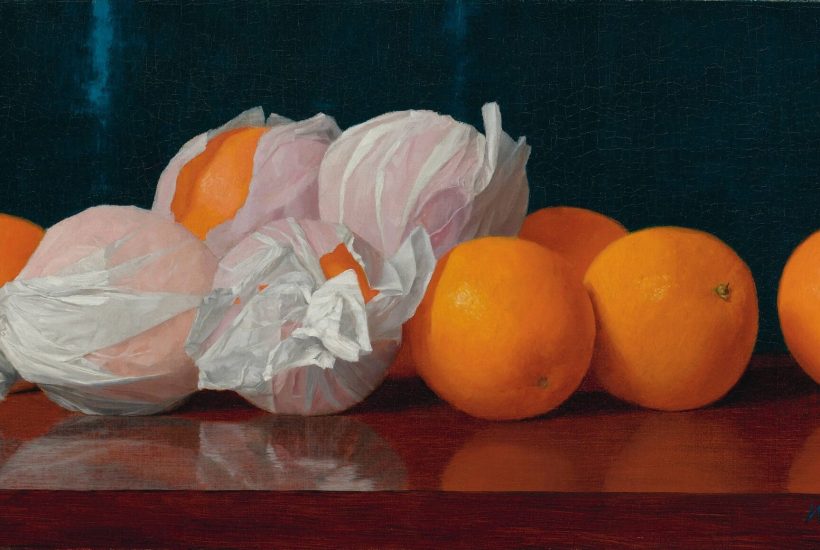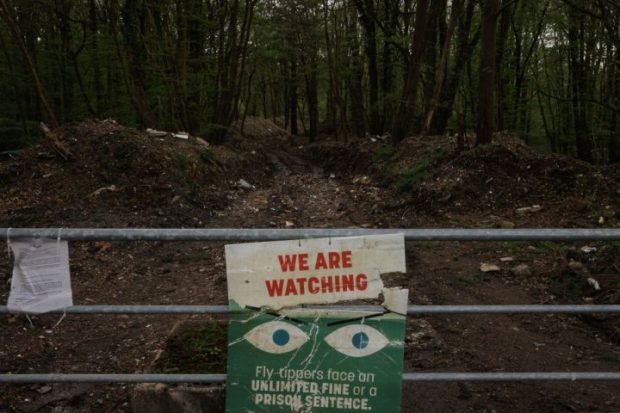‘Your scientists were so preoccupied with whether they could,’ says Jeff Goldblum’s character in Jurassic Park, ‘they didn’t stop to think if they should’. These, among the wisest of that fictional oracle’s many wise words, are what came to mind as I read of a whizzy new pan-European science project called Odeuropa. Historians and chemists in Holland, Germany, Italy, France and Slovenia along with colleagues at UCL and in Cambridge, have spent two years, apparently, working to synthesize the smells of the past. In Germany, they’re even training machines to recognise images relating to smell in libraries of historical images – a notable f’rinstance being pictures of people holding their noses.
They may not be in danger of unleashing pterodactyls on New York, but these Dr Strangeloves of the sinus are threatening us with something equally grim if a bit less entertaining. Among their triumphs so far, it’s reported, are a reconstruction of the odour of the canals of old Amsterdam, described as ‘a throat-catching mix of cadavers, seawater and sewage’. Other successes include a mid-18th-century potpourri and the smell of the library in St Paul’s Cathedral before it was refurbished. We may salute their ingenuity without, I think, seeing exactly why being able to smell the results greatly enhances the sum of human understanding.
There’s a whiff (sorry) of the ol’ diversity and inclusion project in the explanation of why this is being done. ‘There has been a hierarchy of the senses in science and in historical study,’ Cecilia Bembibre of UCL told the Guardian. ‘We want to see a multisensory approach. There has been an idea that smell was a less than noble human sense, and that it was somehow less objective, less educated and even less trustworthy.’ Nobility aside, that sounds to me kind of a sensible assessment.
Smell is the sense, we’re often told, that most deeply and directly connects to memory. Many a neuroscientist with a literary tilt to his or her hat has pointed to the prescience of the madeleine moment in Proust – where a sponge finger dipped in lime tea (taste being smell by the back door after all) precipitates a cascade of childhood memories. But smell’s connection to memory is a personal one – not a shortcut to tribal or species memory.
And at the risk of seeming unfashionably inegalitarian, there may be a good reason that we’ve imposed a hierarchy on the historical sensorium. Smell doesn’t signify, except personally. You can’t reason with smell or, unless you’re a dog or a cat, communicate with it. You can’t analyse smell in a way that will tell you anything about its meaning. And given that smell’s connection to memory is so personal – so dependent on the way your previous experience has wired your individual brain – you can’t, I’d imagine, learn all that much about what it meant to the noses of the past.
We can see the paintings and drawings of the past and learn all sorts of things from them. We can turn ancient artefacts over in our hands and get a sense of what it must have been like to handle them in the era in which they were made. We can read Locke or Hobbes or the letters of George Eliot and understand something of their motivations and ideas. But a whiff of Queen Elizabeth I’s armpit will only tell us that when she boasted that she took a bath once a month whether she needed it or not, she needed it.
One of the relatively few things that we know securely about the past is that most of human history smelt godawful. Item one: open sewers. Item two: infected wounds. Item three: the not-yet-invented art of dental hygiene. Item four: the nonexistence of Persil Automatic. And so on. Fetid breath, reeking armpits, STI-raddled privates, rotting vegetables, horse-piss, dogshit – you name it. The past was like a 1970s underpass only a billion times worse. No wonder plague doctors went around wearing those beaky masks all stuffed with dried herbs.
Paul Strohm’s fine book about Chaucer notes en passant that from his room above Aldgate the future author of The Canterbury Tales would have been treated to a non-stop niff from ‘Houndsditch’, so-called because of the number of dead dogs it contained (along with rotting rubbish, poo from the nearby Priory the odd human corpse and the decomposing severed heads of recently executed traitors. It surely makes sense to imagine that the poet and his contemporaries not only smelled different things but experienced those smells differently. They must have acclimatised. Give a modern scholar a whiff of Chaucer’s London, my guess is that he’d lose his lunch rather than gain an insight into the 14th century.
As Dr Bembibre admits ‘We don’t have historical noses. We just don’t smell in the same way now, and some smells mean different things.’ Indeed, after two years and €2.8 million in EU funding, they haven’t even yet agreed on a methodology: ‘We are trying to decide if it matters academically whether we preserve authentic smells with the right chemicals or whether we simply try to evoke an experience by creating a similar effect today.’
If this project has something to commend it, I suppose, it would be that allowing us to smell the world of the past will bolster our sense of how much nicer it is to live in the modern day. But do we really need to spend millions learning this lesson? The late Bill Hicks recalled being admonished by a nosy passer-by that if he gave up smoking he’d get his sense of smell back. ‘I live in New York City,’ he replied. ‘I got news for you, folks: I don’t want my fucking sense of smell back.’ This seems to me the sort of robust common sense that could usefully be applied to the study of history.
Got something to add? Join the discussion and comment below.
Get 10 issues for just $10
Subscribe to The Spectator Australia today for the next 10 magazine issues, plus full online access, for just $10.





















Comments
Don't miss out
Join the conversation with other Spectator Australia readers. Subscribe to leave a comment.
SUBSCRIBEAlready a subscriber? Log in